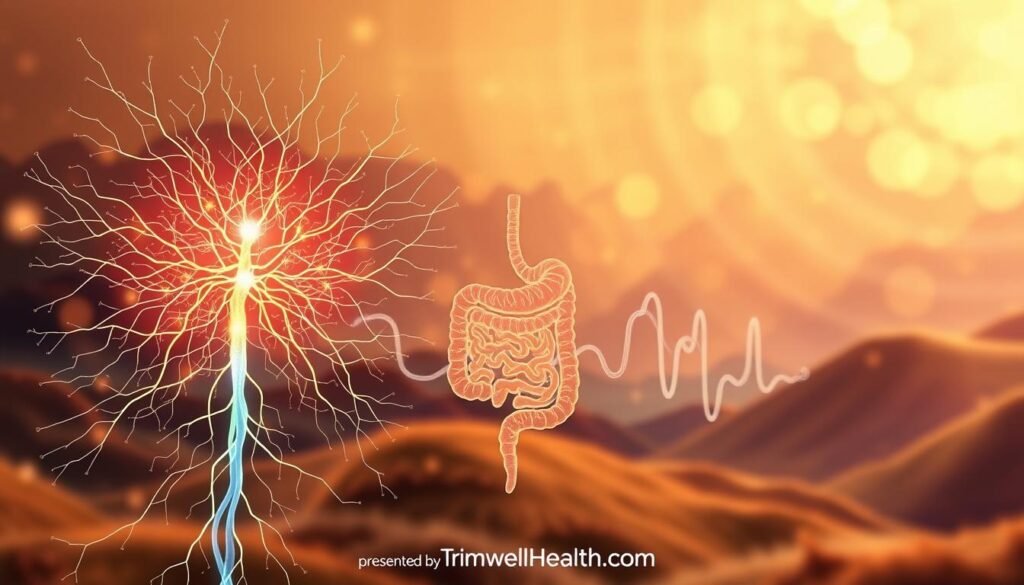Gut Health and Your Emotional Wellbeing: Exploring the Link
Have you thought about how your gut might affect your mood? Research shows a strong link between gut health and feeling good. It turns out, how well your digestive system works can really impact your mind.
This section will show you how important a healthy gut is for your mental health. We’ll look into how the gut and brain talk to each other. And we’ll see how the tiny bugs in your gut play a big role in how you feel.
Key Takeaways
- The gut-brain connection is vital for emotional health.
- Maintaining digestive health can positively impact mental wellness.
- A diverse gut microbiome promotes better emotional balance.
- Diet plays a significant role in both gut and mental health.
- Understanding your gut health is essential for psychological well-being.
The Importance of Gut Health
Understanding gut health is key to knowing its big impact on our health. It’s about having a good balance of gut microbes and good digestion. A healthy gut helps us absorb nutrients, keeps our immune system strong, and helps our body work right.
Understanding Gut Health
Gut health is about the good bugs in our gut. These bugs help us digest food and make vitamins. A balanced gut helps us get nutrients into our blood and use them well.
Why Gut Health Matters
Gut health is more than just physical health. It also affects our mood and mind. Bad gut health can cause many problems, affecting our body and mind. Keeping our gut healthy helps our immune system and makes us feel good, showing how important it is for our life.
The Gut-Brain Axis Explained
The gut-brain axis is a fascinating link between our gut and brain. It shows how our gut and brain talk to each other. This talk affects our mood and how we feel.
Signals from our gut send messages to our brain. These messages can change how we think and feel. This is because of special chemicals like serotonin and dopamine.
The Connection Between Gut and Brain
Our gut and brain are connected in more ways than just eating. The good bacteria in our gut send signals to our brain. These signals help us feel better and stay calm.
Having a healthy gut is key to feeling good mentally. It helps us think clearly and handle tough times better. Taking care of our gut is important for our emotional health.
How Gut Microbiome Affects Emotional Well-Being
The gut microbiome is key to our emotional health. Studies show that certain bacteria affect our mood. Knowing about our gut’s microbes can really help our mental health.
The Role of Microbes in Your Mood
Some gut bacteria make serotonin and dopamine. These are important for our mood. If our gut is out of balance, we might feel more anxious or sad. Keeping our gut healthy can make us feel better emotionally.
Exploring Gut Microflora Diversity
A diverse gut microbiome helps us feel more stable. People with many types of microbes feel less anxious. Eating a variety of foods high in fiber helps our gut. This diversity is linked to better mental health.
| Microbe Strain | Possible Mood Effect | Research Findings |
|---|---|---|
| Lactobacillus | Reduces anxiety | Associated with lower anxiety levels in studies |
| Bifidobacterium | Improves mood | Linked to enhanced emotional well-being |
| Faecalibacterium | Reduces depressive symptoms | Notable evidence for reducing depression |
Gut Health and Emotional Well-Being
Research shows a strong link between gut health and feeling good. A healthy gut helps us feel emotionally balanced. But, an unhealthy gut can lead to feelings of anxiety and sadness.
Improving gut health can make us feel happier and less anxious. Studies say a healthy gut helps us manage our emotions better. This shows how important it is to take care of our gut for our mental health.
The Impact of Diet on Digestive Health and Mood
Diet and gut health are very connected to feeling good. Eating well helps your digestion and mood. Some nutrients for mental health help your gut and mood, leading to better health.
Nutrients that Boost Gut and Mental Health
Important nutrients for gut and mental health are:
- Omega-3 fatty acids: In fatty fish like salmon and walnuts. They help your mood and reduce anxiety.
- Fiber: In whole grains, fruits, and veggies. It keeps your gut healthy, helping your mood.
- Probiotics: Good bacteria in foods like yogurt and kimchi. They help your gut, which is good for your mind.
Foods to Promote Emotional Wellness
Some foods that boost emotional wellness are good to eat. These include:
- Fermented foods: Like sauerkraut and kefir. They keep your gut balanced.
- Fruits and vegetables: Berries, leafy greens, and citrus fruits. They give you vitamins and antioxidants for a better mood.
- Nuts and seeds: Almonds and flaxseeds. They have good fats and nutrients for your gut and mind.
The Role of Probiotics in Emotional Wellness
Probiotics are key for emotional wellness because they help our gut health. They keep our gut microbiome balanced. Research shows they help with anxiety and depression. Taking probiotic supplements can make us feel better.
Benefits of Probiotics for Mental Health
Probiotics and mental health are linked, studies say. They help make serotonin, which makes us feel good. People who eat probiotics feel less anxious and depressed.
- Reduced anxiety levels
- Less severe depressive symptoms
- Improved stress response
Choosing the Right Probiotic Supplement
Choosing the right probiotic is important. Look for these things:
| Factor | What to Look For |
|---|---|
| Strain Diversity | Look for products containing multiple strains to support a broader range of health benefits. |
| CFU Count | Choose a supplement with a sufficient CFU (colony-forming units) count, ideally in the billions. |
| Specific Needs | Consider individual health requirements, such as gastrointestinal support or stress relief. |

By paying attention to these points, you can pick the best probiotic. This choice can help your gut and mind feel better.
The Link Between Stress and Gut Health
It’s important to know how stress affects our gut health. Stress can mess with our digestion and the good bacteria in our gut. This can lead to problems like digestive disorders.
Managing stress is key to keeping our gut healthy. It helps us feel better overall.
How Stress Affects Your Digestive System
When we’re stressed, our body gets ready to fight or run. This changes how we digest food. Stress hormones can make our gut move too much or too little.
This can cause bloating, constipation, or diarrhea. It also affects the good bacteria in our gut. A sick gut can make us feel more stressed and anxious.
Managing Stress for Better Gut Health
There are ways to manage stress and help our gut. Mindfulness, like meditation and yoga, can help. They make us feel less stressed and improve our digestion.
Exercise is also good. It helps our gut work better and keeps the good bacteria balanced. Getting enough sleep is important too. Lack of sleep can make us stressed and upset our digestion.
| Stress Management Technique | Benefits for Gut Health |
|---|---|
| Mindfulness Meditation | Aids in reducing cortisol levels, promoting a balanced gut environment |
| Regular Exercise | Enhances gastrointestinal function and microbiota diversity |
| Adequate Sleep | Restores balance and aids recovery, minimizing digestive system disruptions |
Gut Health Benefits for Overall Well-Being
Good gut health is key for feeling good. It helps both our body and mind. By keeping our gut healthy, we can feel better and live better.
Physical Health Benefits
A healthy gut is important for our body. It helps us in many ways:
- Enhanced Immune Function: A good gut helps our immune system. This means we get sick less often.
- Improved Digestion: Healthy gut bacteria helps us digest food better. This means we get more nutrients.
- Weight Management: Our gut affects how we metabolize food. This helps us stay at a healthy weight.
Improved Psychological Well-Being
Our gut health also affects our mind. A healthy gut can make us feel better in many ways:
- Reduced Symptoms of Anxiety and Depression: A balanced gut can help with mood issues.
- Increased Energy Levels: Good digestion means we have more energy. This makes us feel happier.
- Better Stress Management: A healthy gut helps us handle stress better. This keeps our emotions stable.
Mind-Gut Connection: A Deeper Dive
The mind and gut are closely linked, as research shows. This connection affects how we feel and our gut health. It’s not just a story; it’s backed by science.
The Science Behind the Mind-Gut Link
Hormones and neurotransmitters connect our mind and gut. For example, serotonin in the gut helps control our mood. This shows how our gut and brain talk to each other.
Our gut has trillions of tiny living things called microbes. They help with digestion and our mood. When these microbes change, so can our mood and behavior.
The gut also has its own “second brain.” It talks to our main brain through the vagus nerve. This explains why stress can make our stomach hurt, showing the gut’s big role in our feelings.
More studies are uncovering how our mind and gut work together. This knowledge helps us find new ways to improve our mental health by taking care of our gut.
| Research Focus | Findings |
|---|---|
| Neurotransmitter Production | Serotonin aids in mood regulation and is mainly made in the gut. |
| Microbiome Influence | Changes in gut flora affect neurotransmitter levels, impacting emotions. |
| Enteric Nervous System | Acts independently and talks to the brain via the vagus nerve. |
| Stress and Digestion | Emotional stress leads to digestive problems, showing the mind-gut link. |

Signs of Poor Gut Health and Emotional Disturbances
The gut and emotions are closely linked. Knowing the signs of poor gut health is key to feeling happy and stable. Signs like bloating, irregular digestion, and mood swings often mean there’s a gut problem. Spotting these signs can help fix emotional issues caused by a sick gut.
Recognizing the Symptoms
Poor gut health can hurt your mood. Look out for these signs to know if your gut needs help:
- Bloating and belly pain
- Often feeling sick to your stomach
- Unexplained weight changes
- Feeling tired or having trouble sleeping
- Feeling anxious or moody
These symptoms of poor gut health can make you feel anxious and irritable. This shows how gut health affects our emotions.
When to Seek Help
Knowing when to get help is important for better gut and emotional health. If you’re facing these issues, see a doctor:
- When symptoms last more than a few weeks, even with lifestyle changes.
- If your bowel habits change suddenly.
- If emotional problems make it hard to do daily tasks.
- If you’re always tired or have other health issues without a clear reason.
Getting help from doctors or nutritionists can make your gut healthier. This can also improve your emotional well-being.
Tips for Improving Gut Health
Improving gut health can make you feel better overall. Making lifestyle changes can help your digestive system. Simple changes and natural remedies can make a big difference.
Effective Lifestyle Changes
Changing your lifestyle is key for better gut health. Here are some tips:
- Increase Fiber Intake: Eat more fruits, veggies, and whole grains. They help with digestion and good gut bacteria.
- Regular Exercise: Moving your body helps your gut work better. It keeps things flowing smoothly.
- Practice Mindfulness: Stress less with mindfulness. It helps your gut feel better by easing tension.
Natural Remedies for a Healthier Gut
Using natural remedies can also help your gut. Here are some good ones:
- Herbal Teas: Try peppermint, ginger, and chamomile teas. They can calm your stomach.
- Fermented Foods: Yogurt, kimchi, and sauerkraut have good bacteria. They keep your gut balanced.
- Bone Broth: It’s full of nutrients. Bone broth can fix your gut lining and boost digestion.
Conclusion
The link between gut health and feeling good is really interesting. A healthy gut helps us feel better and be strong. If our gut is not healthy, we might feel anxious or sad.
So, taking care of our gut is key. This helps our mood and how we feel overall. It’s all about keeping our gut happy.
Adding probiotics to our diet can help a lot. They make our gut healthy and improve how we feel. Studies show they can even help us feel as good as when we take medicine for sadness.
By choosing the right foods, we can make our gut happy. This makes us feel better and more stable. It’s all about taking care of ourselves.
Looking after our gut can really help our emotional health. It makes us feel clearer and more stable. For more info, check out this essential resource.
FAQ
What is the gut-brain axis?
The gut-brain axis is a network that connects your gut and brain. It affects digestion and mood through special messengers like serotonin and dopamine.
How does gut health affect mental health?
A healthy gut can help your mood. It makes neurotransmitters that control how you feel. This can lessen anxiety and depression.
What are some signs of poor gut health?
Bad gut health shows as bloating, discomfort, tiredness, mood swings, and anxiety. These signs mean your gut bacteria might be off balance.
How can I improve my gut health?
Eat more fiber, like fruits and veggies. Also, try fermented foods and probiotics. Exercise and manage stress with mindfulness.
What role do probiotics play in emotional wellness?
Probiotics help your gut, which can make you feel better mentally. They might ease anxiety and depression symptoms.
Can stress impact gut health?
Yes, stress can harm your gut. It can cause problems like dysbiosis and digestive issues. So, managing stress is key for your gut and mind.
What foods should I eat for better gut health?
Eat foods high in fiber, like fruits and veggies. Also, try fermented foods like yogurt and sauerkraut. They’re good for your gut and mood.
Is there a link between emotional wellness and gut microbiota diversity?
Yes, research shows a diverse gut microbiome is linked to better emotional health. Different bacteria make neurotransmitters that boost mood.


